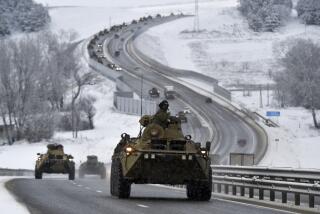Many Muslims in Soviet Union Back Hussein
MOSCOW — Soviet Mikhail S. Gorbachev may be on the allies’ side in the war against Iraq, but many of the Soviet Union’s estimated 70 million Muslims appear to be lined up with Iraq.
“Yesterday, after prayers, an old man of about 80 came up to me and asked, ‘Help me. I want to go and fight on the side of (Iraqi President) Saddam Hussein,’ ” Imam Ravel Gainudin, the senior leader of Moscow’s main mosque, said the other day.
“He said, ‘I fought in the great fatherland war (World War II). I know how to fight and I’m going.’ There are lots of Muslims who feel that way. I say that with full responsibility.”
The Kremlin already is attempting a delicate balancing act in the gulf war by giving political backing to its old adversary, the United States, against its old ally, Iraq.
But another complication--and one that worries some Soviet officials--is the potential that an extended war could stir serious discontent in the mainly Muslim republics in Transcaucasia and Central Asia.
“I’m seriously concerned about the religious factor in the Persian Gulf War,” said Rizo-Ali Odzhiev, a member of the Soviet Parliament from Tadjikistan, in an interview with the Interfax news agency. “How Soviet Muslims will react to the course of the war and its results we don’t yet know. Could it not become a new detonator of inter-ethnic conflicts?”
Like many Arabs outside Iraq, many Soviet Muslims see Hussein as a bold leader, standing up to both Israel and the Western imperialists led by the United States, according to Soviet experts.
Even those who condemn the Iraqi leader are reluctant to endorse the allied cause because of deep distrust for American motives in the war.
Gainudin, for instance, said he believes Hussein to be a “dictator who places his own ambitions before his people’s interests.” But the United States is worse, he said, because it started the war and because its troops amount to “hired killers” pursuing the region’s oil wealth.
“The (U.S.) position was as follows: by dividing the Arab world, the Muslim world, to open for themselves a road for their commercial interests,” he said. “But you can’t solve your own economic problems that way.”
Moscow’s estimated 700,000 citizens of Muslim heritage are relatively secularized, living in a multinational, cosmopolitan capital. In the southern republics, where the overwhelming majority of Soviet Muslims live, pro-Iraq feelings are still stronger, said Viktor A. Girshfeld, a Moscow activist and political scientist who specializes in inter-ethnic relations.
Girshfeld, who regularly organizes seminars involving representatives of different nationalities, said 12 acquaintances from various predominantly Muslim republics called him in the first two days after the war began. Some expressed their own feelings, and all described the initial reaction in their communities.
“Ninety percent of Soviet Muslims are anti-American in this war,” he said. “The educated people are also anti-American but not so strongly. One man said: ‘It’s a white goat (President Bush) vs. a black goat (Hussein). Both goats stink, but the white one is more powerful, so he’s the one we should criticize.’ ”
He said contacts in Dushanbe, the capital of Tadjikistan, reported that various leaflets have appeared in response to the beginning of the fighting. All support Hussein, and those printed by Muslim fundamentalists call for a holy war against the United States.
More to Read
Sign up for Essential California
The most important California stories and recommendations in your inbox every morning.
You may occasionally receive promotional content from the Los Angeles Times.










